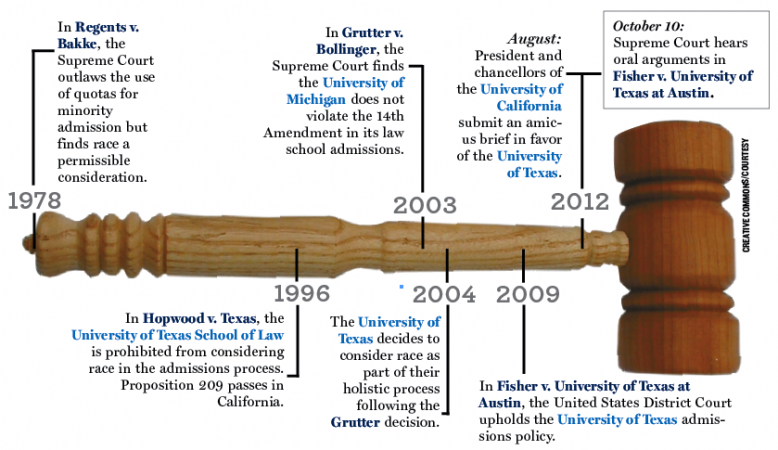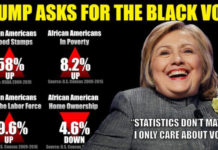Above the entrance of the United States Supreme Court, four words are inscribed: “Equal justice under law.” The court is pondering whether affirmative action breaks that promise. The judges recently accepted a case concerning a vote in Michigan that banned affirmative action, and will soon rule on whether the University of Texas’s race-conscious admissions policies are lawful. The question in both cases is as simple as it is divisive: should government be color-blind?
In every day parlance it seems the strict interpretation of affirmative action only as giving black people a leg-up in society, and not the more problematic giving white women the leg-up, is a contradiction in terms, and the opponents of affirmative action are more and more beginning to sound like race baiters.
It is indefatigable that as far as university admissions are concerned, white women gain the longest and highest leg-up in admission decisions. Come to think of why a female student, who could not beat her own class for a place at the University of Texas even in the face of the overwhelming affirmative action in favor of white female applicants, would sue the school, is obnoxiously unthinkable.
That this dailogue has become centered only on black people rather than raising questions about white female affirmative action in college admissions is seriously problematic. There are more whites who gain access to schools only because they are white and perhaps more recently even female. Female college sports, popularly called Title IX, is a case in point.
Is this an attack on black students and the success they have enjoyed in recent years in educational attainment? Even direr, is this an attempt to quell the upswing of second generation Africans in America whose educational achievements in the past decades in America have become unparalleled? Whatever this dialogue is about, the focus on black students seems too cooked to be organically believable.
As African Americans, we are all too aware of how a system, like America’s, with its proven institutional racism, can become uncomfortable especially with black progress, and how that system can in tandem, morph out a relentless anti-system for the eradication of black progress at the same time.
We saw it at the beginning of the war on drugs, which is still seriously being waged, and we see a similar trend amiss in this conversation about this alleged ‘preferential treatment’ in college admissions for African Americans.
Like Ghana, America is one of many nations where the state gives some assistance, in kind or in cash, to members of certain racial, ethnic, or other groups by holding them to contextual standards, often due to and based on past treatment.
Northerners in Ghana for example are allowed to attend school – up to college level – for absolutely free, while Southerners are made to pay in full. Perhaps due to the vast discrepancy in natural resources? Or rather, a result of age old policy instituted by Ghana’s first president to enable the Northern regions of the country to catch up educationally to the rest of the country.
In the United States, black students (and this may include a ‘white’ student who may have had a black great great grandparent – often referred to as the ‘One-Drop-Rule’) are alleged to be given a leg-up, perchance to atone for past grievous injustices suffered by Africans brought to America as slaves.
The details vary from country to country. However, in some countries, like Ghana, the policy only applies to areas under direct state control, such as public-works contracts or admission to state schools. In others, such as the United States, even private firms are obliged to take count of the race of their employees, contractors and even owners.
Similarly, these institutions in American are equally required to take count of gender (which turns out to be majority white women), sporting prowess (another majority white preferential treatment) etc.
No matter how varied the systems are in different institutions and even countries, the effects are strikingly similar around the world.
In the United States, a poll shows that people who call for scraping affirmative action are overwhelmingly white, with white women being the majority. This is baffling.
Even though Whites in America, especially white women, are cognizant of the role of affirmative action in their lives, they nonetheless disavow its effectiveness. Many seem to believe affirmative action only has to do with race.
They feel peeved that affirmative action favors blacks and though it may seem like a quick and effective way of making society fairer, they affirm that affirmative action may not be playing any role in white women’s progress.
Many whites claim they oppose awarding university places to black students with ‘lower test scores’. In one study quoted by these opponents of race affirmative action, a black student applicant who scored 450 points lower (out of 1600) on ‘entrance’ tests was equally likely to be accepted in some American colleges as an Asian American student. They claim that is neither fair on Asians nor an incentive to blacks to study in high school.
In their book “Mismatch”, Richard Sander and Stuart Taylor, both of whom are white men, they produce ‘evidence’ that suggests race affirmative action reduces the number of blacks who qualify as lawyers by placing black students in law schools for which they are ill-prepared, causing many to drop out. Had they attended less demanding schools, they might have graduated.
More important, other opponents tend to mix class affirmative action policies with race. For example, it is common to find some ‘studies’ that show that the groups covered by race affirmative action tend not to be poorer neighbors, the individuals who benefit are often wealthy – which may be true, but does not contradict the intent.
Perhaps these studies are well meaning. They may probably point a finger at an imperfect system. But while these studies oppose a racial basis for affirmative action, they seem to vehemently defend affirmative action based on gender, class, legacy etc. at the same time.
This amount of vitriol spewed against affirmative action based on race is only a tad bit short of a strong reactive build up of racist sentiment in America.










